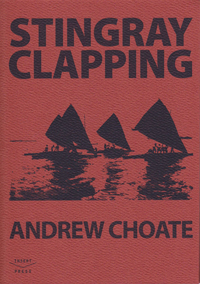 Stingray Clapping
Stingray Clapping
by Andrew Choate
Insert Blanc Press, 2012
56 pages / $12 (Limited Editions $18 – $36) Buy from Insert Blanc Press
necktie popcorn
Andrew Choate’s new book Stingray Clapping, in a small and beautiful volume from Insert Blanc Press, is full of enigmatic, minimal pieces like the above. “Necktie popcorn” is actually a pretty typical example of the stuff in this book: it’s sharp, fascinating, and oddly pleasurable. In a sense, many of these pieces stay true to the old (post)modernist ethos of foregrounding the words themselves; they often appear divorced of any real-world referential quality. Then again, envisioning actual necktie popcorn is also a weirdly enjoyable thought. In fact, nailing down Choate’s poetics with this book is almost impossible given the multitude of readings many of these “poems” allow or refute.
horse by watching
What does someone do with a piece like “horse by watching?” Many works here deny any kind of limited reading because they just don’t make any “sense.” “Horse by watching” could be read as a kind of minimalist, concrete poem; it may even be a sort of pun on something like “hoarse from talking”—or it’s just some random shit thrown together. Much of Stingray Clapping echoes and updates Robert Grenier’s almost-forgotten Sentences, another enigmatic and seemingly nonchalant work of pure pleasure-granting experimental poetry. One of the more intriguing elements of both books is that they don’t make excuses. Choate isn’t rationalizing his “project” here; instead he seems to be celebrating a kind of lazy, half-assed aloofness throughout the work.
It’s odd to think that almost all significant poetry movements of the latest half-century, at least since Olson, have been spearheaded by manifestoes, diatribes, and policies wherein the poet-scholars are engaged in a nervous kind of poetic apologetics for their work, through which they illuminate the otherwise muddied waters of poetry. In the early 21st century (the age of the poetry “project”) we seem to have even arrived at a point where the explanation or the recording of a work is more central (and certainly more interesting) than the work itself. Stingray Clapping, meanwhile, doesn’t have that problem because there is no justification for its existence, other than to give strange pleasure to even stranger people. This pleasure isn’t singular: laughter, bewilderment, and a slack-jawed absorption are a few of the immediate reactions I had while reading it. At some moments the pieces even rise to an unexpected cryptic beauty:
culinary secrets
romantic secrets
technology secrets
family secrets
architectural secrets
educational secrets
military bliss
Rationalizations, excuses, and justifications are now the hidden machines powering most of our poetry. Choate’s work actually contains no “secrets”—it is quite forward in its lack of any particular assertions of “value.” This is poetry that often says nothing, and says it very well. These pieces appear to have been composed in a kind of lazy stupor, with little conscious intent or motive, and this is what makes them special. This book discloses nothing, not even itself:
trade secrets.
At a time when so much poetry is almost singularly concerned with justifying itself, Stingray Clapping represents an attractive, empowering, and refreshing new alternative.
***
Housten Donham is an MA candidate at Mills College in Oakland, where he is completing a thesis on Allen Ginsberg and political poetry. He has a tumblr (elkrunningfromwolves.tumblr.com) and he sometimes contributes to the blog mildred (mildredgroup.blogspot.com). He is currently working on an epistolary poem-essay with Tom Trudgeon via text-messaging.
Tags: Andrew Choate, Housten Donham, insert blanc press, Stingray Clapping

I like the question of laziness. LIke, is it lazier to make a big thing/ make a lot of things or is it lazier to make a small thing, not very much. There certainly seems to be a possibility or even aura of laziness about prolificness.